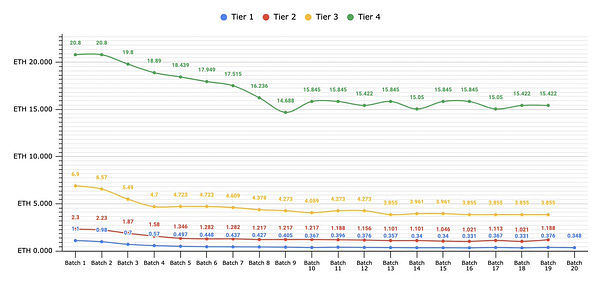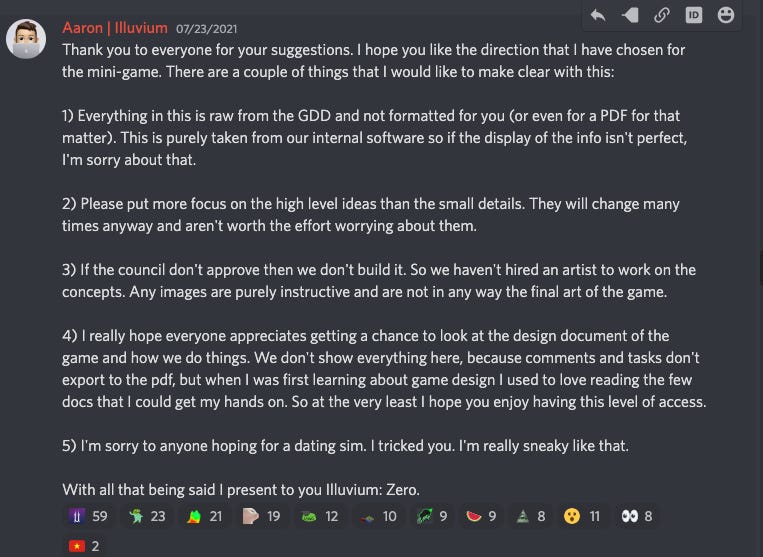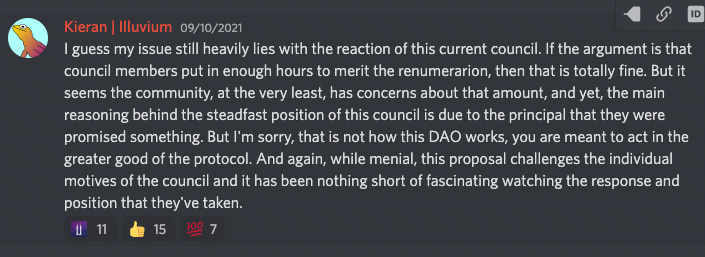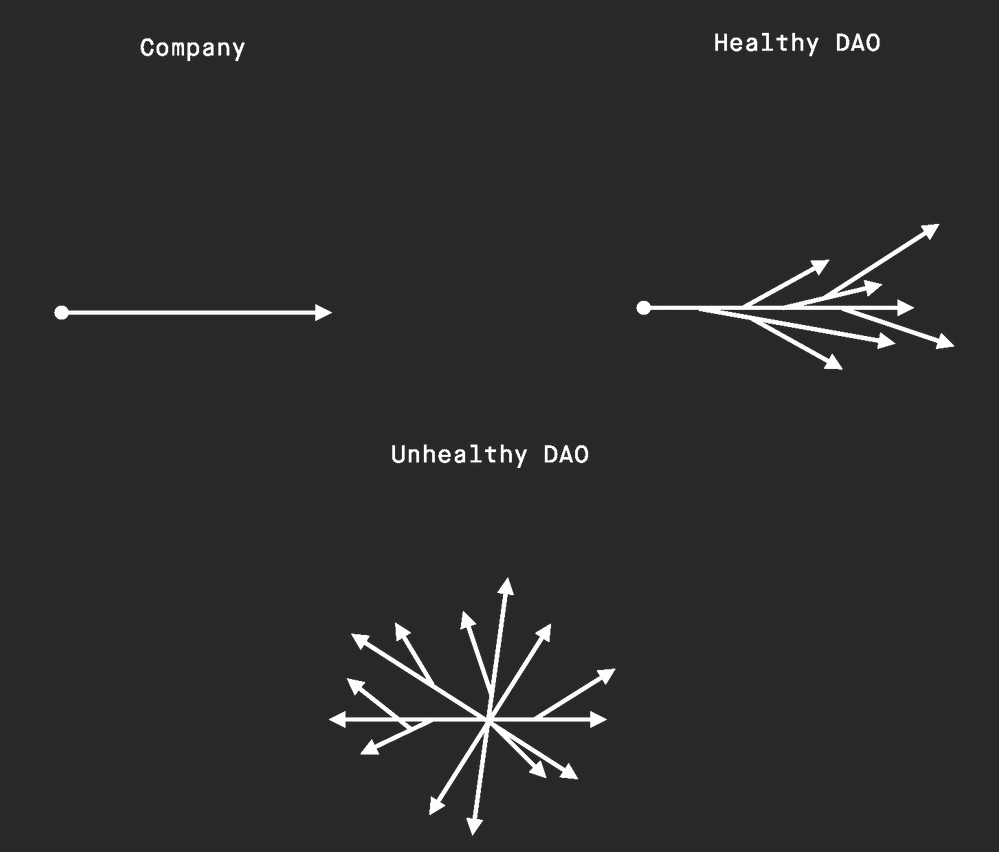We left off with OSRS polling systems that introduced polls and player vote driven development to Runescape. I hope to finally examine applications for these governance structures in crypto games today.
llluvium
To elect council members, holders of $preILV have the ability to nominate an individual for a council seat as well as delegate their vote to a nominee… formal voting period that lasts 72 hours to elect the 5 individuals best suited for the role of governing the platform. - Illuvinati Council Elections
In Illuvium, token holders have the right to vote for a candidate of their choice to sit on the Illuvinati Council. Voting is quadratic to reduce the power of whales. The council gets to vote on two types of proposals:
Illuvium Configuration Change Proposals (ICCPs) - these modify system config variables.
Marketplace fees
Capture mechanics
Balance changes
Council values
Term length, council compensation, nomination deadline, election period length, timelock period before proposal is implemented, size of the council
Illuvium improvement proposals IIPs - these alter broad changes to the system
New contracts
New system proposals
Expansions
Character sets
Governance in Practice
There have been 21 IIPs and 1 ICCP that have been proposed so far (IIP 1 is about the creation of IIPs). All but 2 proposed IIPs have passed. The 1 ICCP also failed. Let’s look into some of the proposals and coin based quadratic game governance in practice.
IIP 4
Automatically place all locked tokens into a newly created ILV pool with a weight configuration of 0 and remove the ability for locked tokens to be staked into the ILV pool or provide liquidity via the ILV/ETH pool that both generate yield rewards.
IIP4 took away the ability of locked investor tokens to farm additional ILV rewards, increasing decentralized distribution of ILV. It upheld their ability to receive revenue distributions from the ILV vault. A win for community token holders.
IIP 10
A 3D isometric city building game will be developed using Unity3d. At least two additional core contributors will be hired. Regular updates will be provided to the community, including proof of concept and a non blockchain linked version for the App Store and Google Play Store. Integration with Illuvium via solidity contracts will be implemented before final release.
The eventual goal is to have the mini-game interface with the main Illuvium game, for the purposes of revenue distribution and NFT creation.
This is the source of ILV Zero and its associated land sale that has drawn some criticism for its high dutch auction starting price.
A minigame was teased since the beginning. Community consensus around what the minigame would be was formed via extensive discussion on Discord. Then, a game design document was posted for further community scrutiny. Once soft consensus on Discord had been established, the document was voted on on Snapshot and passed unanimously.
So yes, there was deep community consensus on almost every aspect of the mini-game (including the dutch auction starting price) - but in this aspect it also revealed the pitfalls of the Illuvium governance system.
Because token stakers get all the revenue generated by the protocol, it is in the best interest of the community to extract the most value from players.
Because of this, there is a misalignment between current token holders and potential players (esp if the playerbase wants to grow past current token holders, DAO members).
The team and early investors get revenue distribution (revdis) as well, aligning their incentives with 1 and further against 2 in edge cases like land sales. Otherwise, it is in their best interest to bring in additional players who will interact with the economy, aligned with token holders and future players.

This is a tough and likely a fundamental governance issue. Ideally, the game is designed for the current player base and the potential ideal player base. But giving early token holders broad power over game development likely alienates potential players. I personally believe that optimum governance models are a function of the type of game, the playerbase and the maturity of the game. Here, perhaps for a game that has not launched yet, granting game design rights via IIPs to token holders was a suboptimal decision.
That being said, revenue distribution is a great way to align incentives between token holders and the team.



In practice the Dutch auction settled at a large discount to starting price (as is the design yes) but still ended up raising 72M USD.
ICCP 1
Reduces council members payments from 30 ILV per epoch to a fixed value of $5000 USDT, per member, per 3 month epoch, payable in ILV.
At the time 30 ILV was worth 5K, at later token prices it was worth up to 30K.
This was one of the most contentious proposals of its time.

How is this at all different from a combination of the EVE CSM and Runescape’s polling system?
Scope of the vote
Council members on IIP10 are able to vote on an entirely new game mode that drives core revenue to token stakers
Players via representatives can control core development resources
Players have voted against the short term financial interest of investors and the team (IIP4)
Despite its radical experiment, there are still some concerns with coin based quadratic voting.
Still some degree of control by whales - on any coin voting scheme this is largely inevitable
Misalignment between existing stakeholders and potential stakeholders (coin holders, investors and potential players)
All the other problems with a representative democracy


A coordinated effort by the whales and dominating whales could have taken all five seats from this election, with over 65% of all votes cast by wallets holding over $500k. At the same time, a coordinated effort by fish through shrimp would have cast 20% of the votes, easily taking at least one if not two spots on the council, while holding only less than 1% of all voting ILV. - Deraji (this is THE guy to follow for ILV analytics).
And so as outlined by Vitalik Buterin in his article, “Moving beyond coin voting governance”, the Illuvium voting method suffers quite a bit of pitfalls.
Whales have dominating voting power
The cost of coordinating for whales is significantly less than that of shrimp and they can easily sway the vote in their favor
Coin voting empowers only the coin interests at expense of other parties (in our case in favor of the whales instead of the actual players of the game)
Are vulnerable to direct attacks and indirect attacks via platforms that attract coin liquidity (via providing APY for staking)
As solutions Vitalik outlines
Limited Governance
Non-coinvoting schemes such as proof of personhood and proof of participation systems
Skin in the game solutions where your vote decides your payout
We will come back to these later.
The Citadel Game
Flamsanct who works on governance at the Citadel Game is extremely knowledgeable about previous governance models. The team is intimately familiar with dikumuds, MOOs, early MMOs and governance structures outlined/to be outlined in Game Governance 1-6. They recently released a governance manifesto about how they plan to structure governance processes in their game linked here.
Some excerpts:
The goal is progressive decentralization over time, where we transition from the Core Team operations being augmented by the DAO to the DAO operations being augmented by the Core Team. This won’t happen overnight, but it is the North Star that guides our efforts.
Decentralized autonomy means the freedom for any single part of the whole to move and experiment in new directions without necessarily asking for permission
From the creative chaos of divergence, the process of convergence is one of bringing the best ideas together, identifying overlapping themes, and then consciously integrating and making decisions.
Convergent attractors can be used to counterbalance the emergent tendency toward divergence and can take many forms, including:
A council of elected leaders who provide administrative oversight, guidance, and fallback decision-making for other groups.
Promoting an ethos of proactive communication, asking leaders of groups to share the lessons they have learned and maintain an open feedback loop.
Catalyze social and cultural community building that strengthens relationships and communication across the DAO.
Gamification and economic incentives that reinforce the organization’s greater mission and values.
This approach solves a big problem with self-governance in that a pure direct democracy decision-making model doesn’t scale very well. With working groups and constrained delegation, we can empower trustworthy and capable community members to act independently on the DAO’s behalf. Those that have the most context for making good decisions are trusted to use their judgment, but are still accountable to the voting body of the DAO.
The general idea is to allow coordinated working groups of high context individuals to make choices on their own, with a coordinating council working on bringing convergence of mission, direction into the autonomous actions of each working group. They envision this “central command” to be either
An autonomous council - a CSM
All leaders of all working groups form the council
Some combination of the two
Further Considerations
The Citadel Game wants to implement a badge and season system.
One use case for levels could be minimum level requirements for gaining access to various community and DAO-related privileges. It could make sense for leadership roles to require minimum levels to even be eligible for consideration.
Another possibility is where levels that generally coincide with senior or leadership roles (Level 6 and up) can’t be earned automatically and require satisfying a set of pre-requisites to be considered for manual promotion by higher-ranking roles in the DAO. With this approach, we could even consider entrusting special privileges to the highest levels like limited moderation powers in Discord.
This is very similar to what we’re working on at Metaportal with some large crypto games - be on the lookout for an announcement!
In the next piece, I hope to dive further into credentialing and using this “badge and season system” in games to uniquely implement Vitalik’s suggestions on counterbalancing the bad forces of coin governance.












